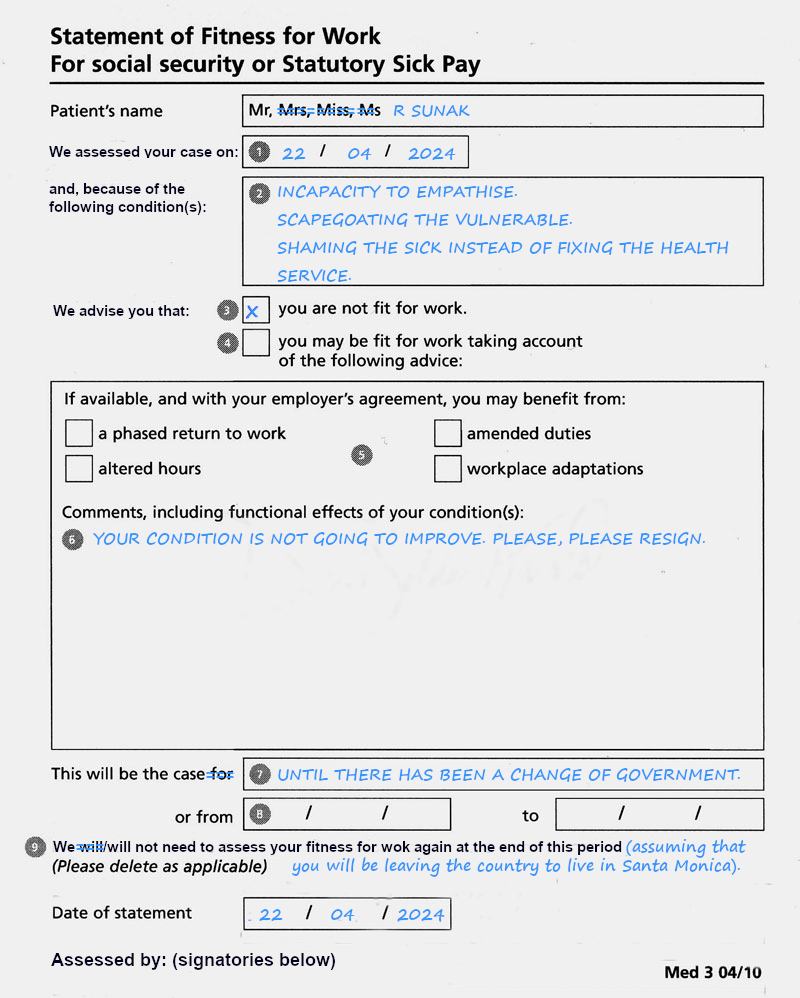PS find her albums on Spotify!
Author Archives: Dominic Minghella
Rishi Sunak’s Sick Note
I don’t know about you, but I was appalled by Rishi Sunak’s assault on the sick last week. He patronised, he scapegoated and he blamed.
Not content with going after experts, civil servants, teachers, lawyers, doctors, nurses, rail workers, and anyone else they can think of to try to divide us, they’ve gone for the unwell.
Listening to Sunak’s speech (announcing policy, once again, outside Parliament and in contravention of our democratic norms) I thought I wouldn’t give the bloke so much as a ‘Fit Note’ to carry on in his job.
In fact I took it upon myself to write him a Sick Note.
By popular demand, I’ve made that Sick Note ‘signable’ – so please, if you concur, add your name and share with friends and family.

You can sign Rishi Sunak’s Sick Note at Action Network here.
Arresting Beauty, by Heather Cooper

Heather Cooper’s excellent historical novel invites the reader into maverick, pioneering photographer Julia Margaret Cameron’s Isle of Wight home, and into the lives of illustrious artists like the neighbouring Tennyson, through the eyes of Mary Ryan – a beggar girl scooped up by Cameron from the streets of Putney. Mary progresses from parlourmaid to photographer’s model to gallery assistant, but even if she can walk the downs and talk poetry with the Poet Laureate, she can’t shake off her humble origins. Or can she?
Cooper’s intelligent prose matches her bright, plucky, unpretentious heroine, Mary Ryan, who finds herself serving in the household of Julia Margaret Cameron. Here she meets the great and the good – Tennyson, Browning et al – and becomes a model for her mistress’s stylised, allegorical photography.
‘I longed to arrest all beauty that came before me and at length the longing has been satisfied.’
Julia Margaret Cameron
Cooper, like her character, respects society’s luminaries rather than idolizing them, preferring to focus on Mary’s private ambitions for self-improvement and security in a world where women, especially those ‘in service’, are unlikely to achieve either. This is a ‘below stairs’ book, not a celebration of the literati. The narrative is beguilingly simple, making Mary’s rapid social progression pleasingly credible, and always engaging. The reader yearns for Mary’s success, and with some nods to Austen along the way, Cooper delivers.
For anyone who knows and loves the Isle of Wight, there had to be a right way to tell the story of life in Julia Margaret Cameron’s Dimbola Lodge, and Tennyson’s Farringford, and Cooper has found it. ARRESTING BEAUTY is a gem.
Published 30 September 2023, Beachy Books.
www.beachybooks.com
If the Guv’nor wrote honestly to the Chancellor
BANK OF ENGLAND
from the Governor
Jeremy Hunt
Chancellor of the Exchequer
HM Treasury
27th August 2023
Dear Jeremy,
I think it’s time we were straight with the British people.
Interest rate hikes are the wrong tool to curb the UK’s inflation. Continued hikes will be very harmful to our fragile economy, and Government must seek other, more effective and more equitable means to bring it back down to target.
Our most recent analysis shows that, on current trajectory, 50% of all businesses, and up to 70% of smaller ones, will face debt distress by the year end. This is an emergency. Although we have previously indicated that we would maintain high interest rates for years rather than months, it is now clear that to do so, would entail severe damage to UK businesses and individuals.
We both know that interest rates are a better method of controlling inflation when it is caused by too much money chasing too few goods (or “demand driven”). But that is not the case with the inflation currently troubling the UK, which is and remains supply-side driven. It is not caused by too much money in ordinary people’s pockets – after all, we know that real median wages have fallen by 5% since 2010. Even recent pay increases have not kept pace with inflation, which, we ought to admit in all honesty, means that they tend to pull overall inflation down, rather than add to it.
The sources of our inflation are not the ‘fault’ of British consumers – they stem back to the war in Ukraine, and to trading frictions exacerbated by Brexit. We have avoided admitting the latter too, but in the end, economic stability depends on fundamental institutional trust, so this is something about which we, as leaders of the UK’s two most important financial institutions, ought also to be honest.
My role as Governor gives me only one lever to help bring inflation down to target. I am no longer happy to suggest to British businesses and individuals that the lever of interest rates offers the whole solution – or even anything more than a partial, incidental remedy – to the inflation the country is currently facing.
Instead, we must look to Government to take the right steps. Only Government can cap energy prices at a rate low enough to ameliorate inflationary pressure, as has been done in other countries. Only Government can level meaningful windfall taxes on the excess profits of energy companies to pay for capped prices. Only Government can work with our trading partners in the EU to reduce the frictions caused by Brexit, and the cost increases those frictions cause, in order to bear down on prices in the UK. (The Windsor Framework shows that Government CAN negotiate for smoother trade; in this profound crisis, it must continue, and redouble, such efforts.)
Only Government can re-empower regulators such as Ofgem so that they can fulfil their obligations to ensure value for money and keep price rises for essential services at bay. Only Government can lead the way in building capacity in green energy generation, thereby smoothing out the supply shocks of the future (not to mention addressing the climate emergency).
Interest rates have a far smaller role to play in tackling the inflation confronting the UK than we have thus far implied. Yes, they indicate to markets that we are serious about addressing inflation (but only in the way that a doctor applying leeches indicates an intent to deal with a disease). Yes, they have the effect of increasing the value of the Pound in foreign exchange markets, which in turn reduces the price of imports. But their core traditional function as a brake on spending, as a method of dampening demand-led inflation – when too much money is chasing too few goods – is the wrong fix at the wrong time. The problem is not demand, it is supply, and only Government, not the Bank of England, can act to lubricate supply, use the fiscal system to cap abnormal prices and profits, hold down core prices, ensure proper long term regulation, and invest in a smoother, greener supply side future.
With half of all our businesses facing debt distress before the end of this year, and millions of Britons facing dramatic increases in mortgages and rents, it is time to change tack. This is not a traditional inflationary cycle, and traditional methods aren’t going to work. The sooner we are honest about it, the better.
Yours,
Andrew Bailey
Governor
Inspired by my excellent friends over at The 99 Percent Organisation
